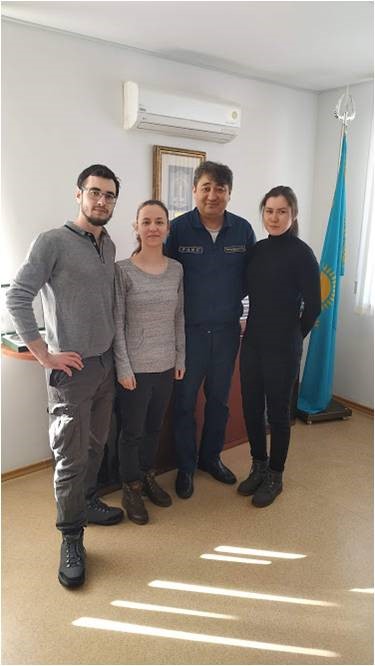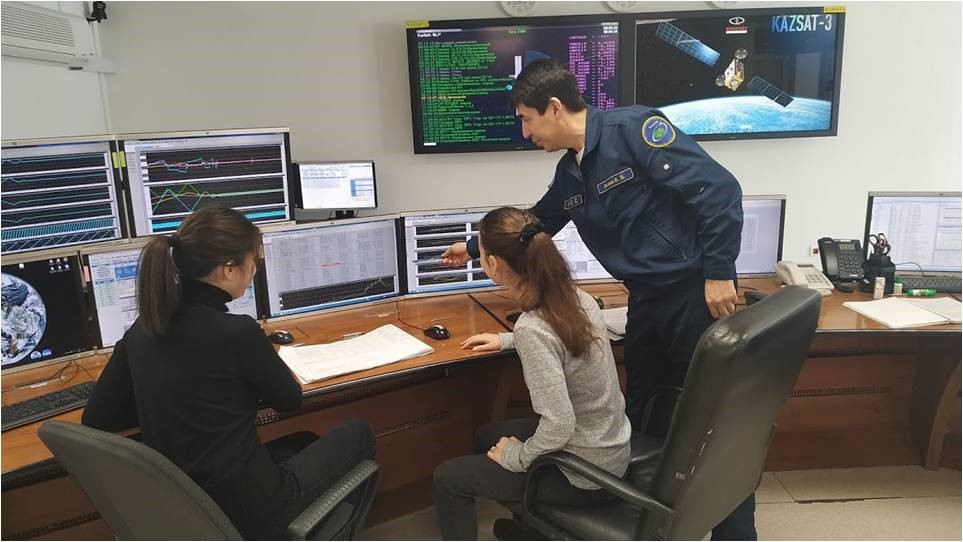"We can hear the heart of Kazsat beating! - young engineers of the RCSC

AKKOL. AKMOLA REGION. KAZINFORM-Today the specialty "space engineering and technologies", which the National Space Agency (Kazcosmos) has integrated into the higher education system of Kazakhstan, is relevant and in demand. The first graduates of space specialties come to work at the enterprises of Kazkosmos. The summer of 2021 was crucial for two graduates of the Faculty of Mechanics and Mathematics of Al-Farabi Kazakh National University-they came to the small town of Akkol, a hundred kilometers from the capital, to become cool specialists in space communications. In their interview with the correspondent of "Kazinform" INA Daria Komarova and Karina Pangireeva told about what made them choose a provincial town in the north of Kazakhstan and fall in love with Space.
- Daria, Karina, since July 12, 2021, you have become employees of the Akkol Space Communications Center. How did you find out about this center, why did you decide to work here during the distribution?
Daria: Our acquaintance with the "Akkol" Center for Space Communications (CSC) of the Republican Center for Space Communications (RCSC) began at the beginning of 2019, when we, three students from Almaty, first came to a small town called Akkol. This trip completely changed our attitude to the future specialty. In the 2nd semester of the 4th year of study at our department in the specialty "space engineering and technologies", the task was to pass the professional practice. The university distributed students to Almaty companies related to space activities. We had a choice: to find something new or to get acquainted again with the place where we have been more than once. We remembered a small excursion to the ground control complex "Kokterek" (GCC), located near Almaty. There we learned that there is a similar GCC located near Astana, which is the main control complex of Kazakhstan's communication and broadcasting satellites "Kazsat". Then we contacted the personnel department at Akkol and agreed to undergo the professional practice at the Flight Control Center (FCC).
Karina: On January 13, 2019, we were standing at the railway station of the northern capital. Looking at the snow-covered roads on the way to our future, we had no idea what kind of people and impressions were waiting for us. Next day we arrived at the Akkol CSC and began to get acquainted with the employees and their work. We were given a tour of each department and the complex as a whole. On the same day, we made a practice plan for two months. So we ended up in the Flight Control Center. It was incredible for us that we, in Kazakhstan, have a center where you can control satellites in space with your own hands at an altitude of about 36,000 km, that the incomprehensible cosmos can be so close!
- How were you met at the Center?
Daria: From the first day, we felt the attention, care, and warm attitude of all the employees, and, of course, we were impressed by their knowledge. Thus, we were given access to the documentation on the composition of the Kazsat-2 and Kazsat-3 satellites. We could turn to any of the employees for help at any time, and even if we didn't always ask questions, they came up to us and told us. We were very impressed that lectures are held on Thursdays, and every week the lecturers changed. Despite the existing knowledge, the staff of the Space Communications Center continued to learn something new. Each stage of our plan was accompanied by a small oral exam, which allowed us to memorize the material better and prepare harder further. Noticing our interest, they began to show us more in practice what we read about. At the software complexes, we were explained the relationship of satellites systems, as well as in the ballistic and navigation support sector, they showed how it is possible to directly influence the movement of the satellites. Sometimes we were even allowed to press some buttons: at such moments, pride and responsibility simply overwhelmed us!
Karina: During the two winter months of living in Akkol, we have become very accustomed to the peace and quiet of the city. At that time, our relatives asked us, how are you not bored there, in a small city? After all, our center is located among a pine forest, and we go to work on foot. But we have never been bored. After all, if you want, you can always find your own occupation. On the weekend, we walked through the forest. And to us, Almaty children, 50 cm of snow seemed something unreal. At that time, we often joked that there is not so much snow in Almaty for the whole winter, as here at a time. We were very lucky that on one of the first days we noticed a guitar behind the cabinet at the head of the FCC. We spent several days gathering the courage to ask her to take it. Of course, we were allowed to take it, and it really brightened up our evenings and weekends. We fixed the guitar, twisted the strings, and it already sounded warm and cozy. In such an atmosphere of support, warmth and friendship, two months of practice quickly flew by. We have not only gained a good base of theoretical knowledge, but also reinforced it with practice. During this time, the three of us became very close friends and already on our return to our hometown we felt like a small family. At the end of the professional practice, the head of the FCC Kairat Kuandykovich Telgarin asked about our future plans and offered to return to the center as employees. What we did: we completed a two-year master's degree in the same place at the al-Farabi Kazakh National University in our specialty, passed an interview and came back to Akkol in the summer.
- And since July 12, 2021, master's students of space engineering and technology Daria Komarova and Karina Pangireeva have been employees of the Akkol Central Research Center. What are your impressions now, how would you explain in simple words what a "cosmic connection" is?
Daria: At the moment, we have completed the trial period, passed the exam, and we were given access to control satellites. Now we are studying the work of the FCC in more detail. For us, the start of work was not something new, but only became a continuation of the movement that began two years ago. Here we were greeted as old acquaintances, with the same warmth and soul as before. We heard "welcome back" from all the employees. By the way, the third member of the team, Roland Pilpani, after completing his master's degree, went to China to further improve his knowledge, because our space specialty is in great demand all over the world now.
Karina: There are three departments in the Flight control center: the flight control department - the state of the satellite is continuously monitored here. In simple words, this function can be compared with the human body – it's like connecting a lot of different sensors to a person and watching his condition. Whether the pressure is in order, whether the heart is beating, and so on. And if something happens, it will definitely be displayed on the monitor, in which case it is necessary to take measures to eliminate the bad condition. For us, the satellite is a person who is under constant supervision, and we are his doctors. And our main task is to take care of him. The second department of ballistic and navigation support is like a mother who does not let a child stumble and fall, does not let him go off the right path. That is, the employees of this department constantly adjust the orbit of the satellite movement. And in the department of planning and monitoring the state of the satellite, they describe the tasks that the satellite must perform at the right time. In the same department, all tasks are recorded in a language that the device understands. We can say that for a satellite, this department is a friend who will tell him what to do.
Daria: We are often asked "how was it possible to move here from Almaty, to the "forest"? But, as they say, "it's not the city that makes people, but people make the city." We are very glad that this city and people-specialists and employees of the RCSC, and, in particular, the Akkol Central Space Station, gave us the opportunity to understand and hear how the heart of our Kazsat communication satellites beats in space, to be involved in the uninterrupted provision of space communications to our country - the Republic of Kazakhstan!
- Thank you for a sincere interview, girls. Good luck, success, happiness!
https://www.inform.kz/ru/my-slyshim-kak-b-etsya-serdce-kazsata-molodye-inzhenery-rcks_a3835126


















